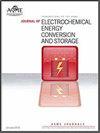Design of an improved modular multilevel converter reconfigurable equalization scheme based on difference of voltage variation
IF 1.9
4区 工程技术
Q3 ELECTROCHEMISTRY
Journal of Electrochemical Energy Conversion and Storage
Pub Date : 2023-11-08
DOI:10.1115/1.4063847
引用次数: 0
Abstract
Abstract In order to solve the problem of lower available capacity and shorter cycle life due to the barrel effect of series-connected batteries, as well as the problem of pseudo-equalization caused by battery aging, this paper proposes a modified modular multilevel converter (MMC) reconfigurable equalization scheme with difference of voltage variation (DOVV) as the equalization variable. The equalization topology consists of an MMC circuit and a voltage regulator, which effectively solves the problems of low total available capacity, inefficient energy transfer, and slow equalization by reducing the number of switches and achieving independent control of the equalization and voltage regulator modules. A control strategy based on the Oxford aging dataset is proposed with DOVV as the equalization variable, and a fuzzy logic control algorithm is introduced according to the distribution characteristics of DOVV data. This equalization control strategy overcomes the pseudo-equalization phenomenon due to battery aging. The simulation results show that compared with the traditional DC–DC energy transfer equalization topology, the energy transfer efficiency of the proposed equalization topology is improved by 62.15% and the equalization time is reduced by about 16.36%, and the pseudo-equalization phenomenon caused by the aging of the battery pack during the equalization process is well overcome. The feasibility of the proposed equalization scheme is verified.基于电压变化差的改进模块化多电平变换器可重构均衡方案的设计
摘要为了解决串联电池的桶状效应导致的可用容量降低和循环寿命缩短的问题,以及电池老化导致的伪均衡问题,提出了一种改进的模块化多电平变换器(MMC)可重构均衡方案,以电压变化差(DOVV)为均衡变量。均衡拓扑由MMC电路和稳压电路组成,通过减少开关数量,实现均衡模块和稳压模块的独立控制,有效解决了总可用容量低、能量传递效率低、均衡速度慢等问题。提出了一种基于牛津老化数据集的控制策略,以DOVV作为均衡变量,并根据DOVV数据的分布特点引入模糊逻辑控制算法。该均衡控制策略克服了电池老化引起的伪均衡现象。仿真结果表明,与传统的DC-DC能量传递均衡拓扑相比,所提出的均衡拓扑的能量传递效率提高了62.15%,均衡时间缩短了约16.36%,并且很好地克服了均衡过程中电池组老化引起的伪均衡现象。验证了所提均衡方案的可行性。
本文章由计算机程序翻译,如有差异,请以英文原文为准。
求助全文
约1分钟内获得全文
求助全文
来源期刊

Journal of Electrochemical Energy Conversion and Storage
Engineering-Mechanics of Materials
CiteScore
4.90
自引率
4.00%
发文量
69
期刊介绍:
The Journal of Electrochemical Energy Conversion and Storage focuses on processes, components, devices and systems that store and convert electrical and chemical energy. This journal publishes peer-reviewed archival scholarly articles, research papers, technical briefs, review articles, perspective articles, and special volumes. Specific areas of interest include electrochemical engineering, electrocatalysis, novel materials, analysis and design of components, devices, and systems, balance of plant, novel numerical and analytical simulations, advanced materials characterization, innovative material synthesis and manufacturing methods, thermal management, reliability, durability, and damage tolerance.
 求助内容:
求助内容: 应助结果提醒方式:
应助结果提醒方式:


